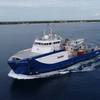Maersk May Reward Shareholders as Oil Unit Suffers
Danish conglomerate A.P. Moller-Maersk may announce a second share buyback scheme in its 110-year history as early as Wednesday, analysts said, allowing it to reward shareholders as its oil unit takes a battering from a slump in prices.
Further divestments from its large portfolio of companies may also be on the radar, funding any buybacks or at least increased dividends, with the world's largest container shipping company focusing more closely on the shipping and oil industries.
Maersk's will present its fourth quarter results at 0700 GMT on Wednesday. Net profit is expected to rise 9.8 percent to $1.0 billion, boosted by a 59 percent rise in container shipping but hit by a 50 percent drop in its oil business.
Analysts say some sort of impairment charge on Maersk's oil assets is likely, after the oil industry was forced to write down billions due to a slump in the oil price in the second half of last year.
"Divestments are likely to finance growth and cash distribution," analyst Stig Frederiksen from Nordea Markets wrote in a note, adding he expected a $1 billion share buyback to be announced on Wednesday.
The company announced the first such scheme in its history to the tune of $1 billion last August, sending its shares soaring to peak at a record high in mid September at 15,220 crowns each. They have fallen around 7 percent since.
As Maersk laid out a strategy in recent years of focusing on four to five core business units, it has sold off businesses such as a stake in Netto supermarkets and its one-third share in fellow Danish shipping company DFDS.
It has also sold off its fleets of Liquified Natural Gas (LNG) vessels, Floating Production Storage Offloading (FPSOs) vessels and crude oil tanker vessels.
Analysts said up next on the block could be Hoegh Autoliners, operator of a fleet of 60 vessels that transport vehicles, and airliner Star Air.
Logistics company Damco, tugboat operator Svitzer and Maersk Supply Service, providing offshore oil services, have also been mentioned as disposal candidates.
"They will continue to divest companies in the coming years. One example is Damco, where there is no synergies related to owing the company but I think a turnaround is needed before a divestment can take place," analyst Jacob Pedersen from Sydbank said.
The global logistics industry is recognised as fragmented and consolidation is expected by many. Singapore-based Neptune Orient Lines announced a sale of its APL Logistic unit to Kintetsu World Express earlier this month.
A.P. Moller-Maersk has booked accounting gains of more than $4 billion and a positive cash flow of around $10 billion since 2009 when management initiated a strategy to lift profit.
By Ole Mikkelsen












